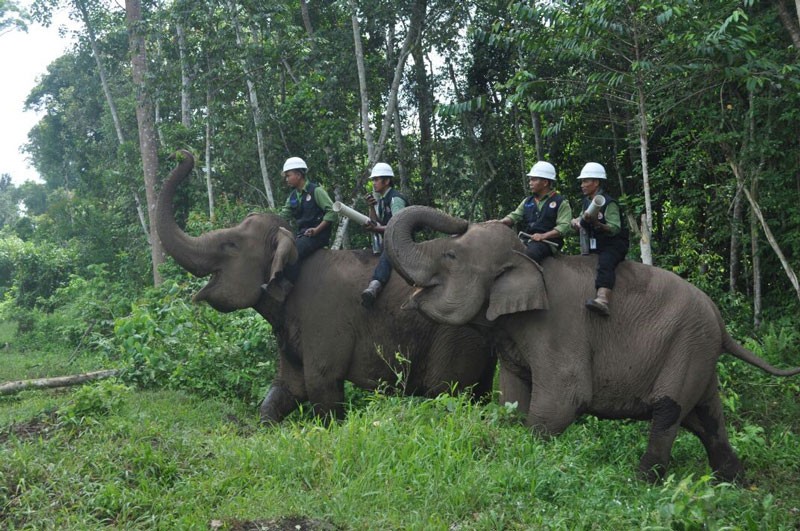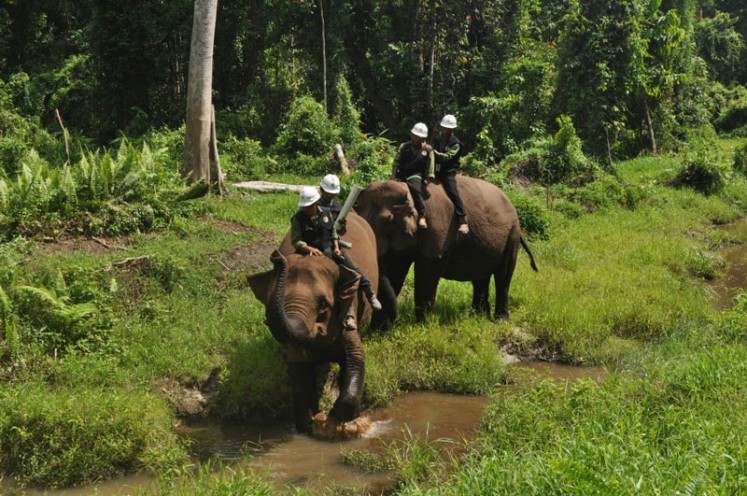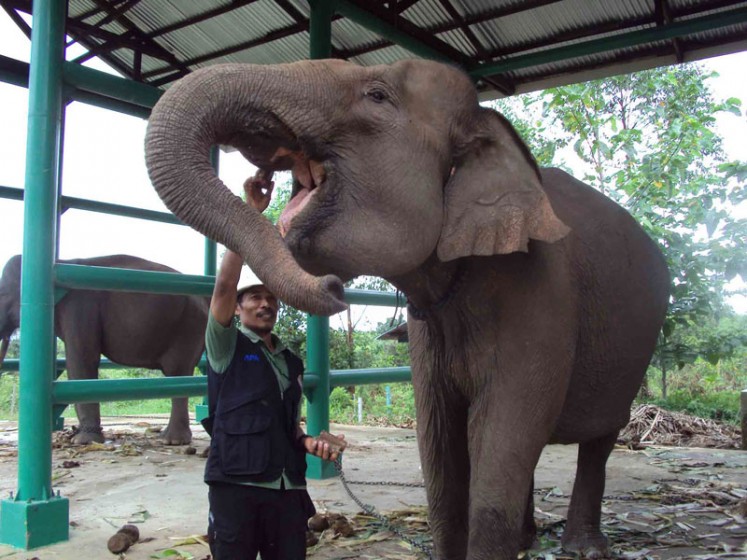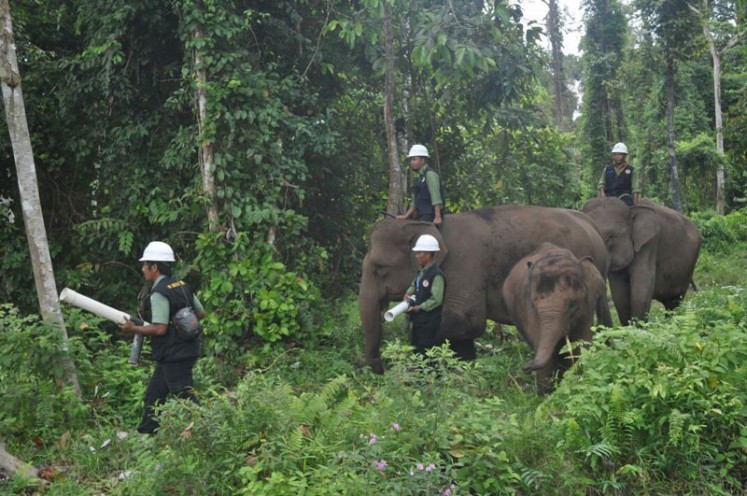Popular Reads
Top Results
Can't find what you're looking for?
View all search resultsPopular Reads
Top Results
Can't find what you're looking for?
View all search resultsElephant Flying Squad Keeps the Peace
When wild elephants trample plantations surrounding the Tesso Nilo National Park, the Flying Squad comes to the rescue.
Change text size
Gift Premium Articles
to Anyone
W
hen wild elephants trample plantations surrounding the Tesso Nilo National Park, the Flying Squad comes to the rescue. This is not a group of people who wards off wild elephants, but a flock of four domesticated elephants with nine handlers (mahouts) who form a rapid response unit ready to manage conflict in villages bordering the national park.
At present, it is home to between 400 and 500 wild elephants.
Established by the then-Ministry of Environment and APRIL Group in July 2006, the team’s name -- the Flying Squad -- reflects how quickly the team is able to deploy at anytime and anywhere they are needed. Their base camp is the PT Riau Andalan Pulp and Paper (RAPP) Ukui Estate area in Lubuk Kembang Bunga village, in the Ukui district in Pelalawan Regency, which is in the heart of elephant territory.
The group’s existence reflects a deeper issue. Despite being designated a conservation area in 2004, the national park has suffered from extensive illegal encroachment and degradation. This has led to the depletion of food sources for wild elephants, as well as encroachment on their territory, often driving them to wander into surrounding plantations in search of food including palm oil, bananas, rubber leaves and pulses.
The squad’s aim is to ensure the peaceful co-existence between communities, elephants and the land.
Didik Purwanto, assistant to the Head of Forest Protection, RAPP said: “Conflict can arise when people view these elephants as a threat to crops. The objective of the Flying Squad is to detect and herd wild elephants away from residential areas. The task is to help herd them back, not to capture them. The agency tasked with catching the elephants is BKSDA, or the state’s Nature Conservation Agency. These domesticated elephants are basically state-owned. BKSDA Riau has handed over the management of the team to RAPP, which reports quarterly to the agency about the activities the team are engaged in.”
“The team monitors the wild elephants twice weekly by tracking their movements to areas that are off-limits. When they do spot elephants or when there are reports of them leaving the national park, they are immediately herded back to the park to prevent them from destroying crops or even killing people.”
Didik said that whenever the team herded elephants, they liaised with the local community to ask them in which direction the elephants should be herded. We don’t make the decision on where to herd the elephants by ourselves, we involve the community. So if the people want the elephants to be herded away from the company’s concession estate, for example, the team and the people will herd them towards the conservation area that has been prepared for them.
Aside from drawing in wild elephants with trained female elephants, the team also uses carbide cannon and firecrackers to help with the herding.
“It is more difficult to chase away a lone male elephant because it usually tends to fight back. It is different if the elephants move in a herd. We only need to herd the leader and the others will follow,” said Didik.
“Often, male elephants fight. When this happens, we immediately take our domesticated elephants back to the base camp to avoid any conflict. We must ensure the safety of the domesticated elephants because wild elephants will attack other elephants during this time,” he added.
Since it was formed, the team has handled dozens of cases of elephants straying onto plantations. So each year, the loss continues to decrease. “In the past, people hated the sight of elephants. Now, with the Flying Squad, they are starting to develop a different view. Now, they like to see the domesticated elephants. Children often come to the base camp to play with them,” he said.
Besides herding wild elephants, the Flying Squad also plays a role in firefighting and combating illegal logging. The campaign to eradicate illegal logging started in 2007. The Tessa Nilo landscape is highly susceptible to forest fires because it is surrounded by more than 20 villages. Illegal loggers often burn trees, which they have felled, to make way for palm oil plantations.
To prevent the fire from moving onto the 16,500-hectare Ukui Estate concession area, RAPP has formed a firefighting team made up of 15 members from all units, including the Flying Squad. Arif Riyadi, one of the mahouts who is also a member of the firefighting team, said the domesticated elephants are involved in locating illegal loggers and arsonists, because they can cover a wider area.
“If there are no wild elephants, the targets of our patrols are illegal loggers and watching out for plumes of smoke. Once we detect these, we report it to the company’s forest fire central command for further action,” he added.
The role the elephants in preventing forest fires is now known to many people. Many visitors, students and partners of RAPP from other countries, came to the Flying Squad base camp to see the elephants.
Visitors can also go on patrol with the Flying Squad and get to ride the elephant along a short track.
The mahouts in the base camp are graduates of the Way Kambas elephant training center in Lampung and Minas in Siak. “We are employed by RAPP specifically to take care of the elephants in the Flying Squad,” said Riyadi.
To preserve their health, the elephants consume a special pudding made up of brown sugar, cassava, corn, bran and mineral salt. “This additional nutrition is given daily to help with their activities like practicing, patrolling, and performing. They also eat various fruit like pineapples, water melon, bananas and tomatoes. These are good for their digestion,” he said.
With good care and treatment, the RAPP Flying Squad has successfully added to the population of Sumatra elephants with the birth of two elephant calves in 2009 and in 2011. “We named the female calf Carmen. Her parents are Adei and Ika. The male calf is named Raja Arman and his parents are Adei and Mira,” he explained.
Domesticating an elephant does not take too long, about half a year, he said, adding: “After we train an elephant non-stop for a year, we can allow visitors to ride it.
“Taking care of domesticated elephants until they can have calves is not easy. To be able to do this proves how serious RAPP is about its commitment to conservation. Indeed, with the Flying Squad and its impact, RAPP has proven to be successful in its elephant conservation program,” he added.













